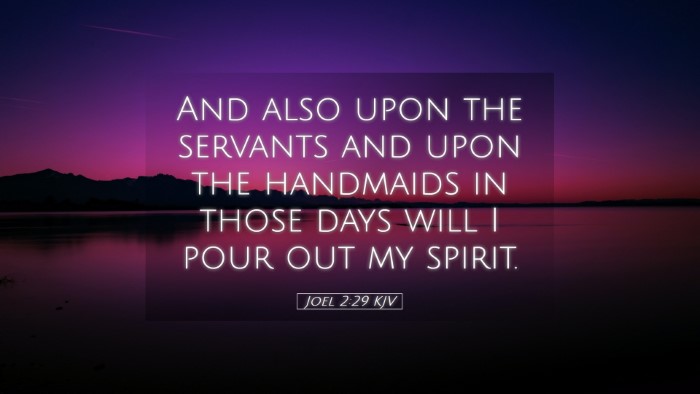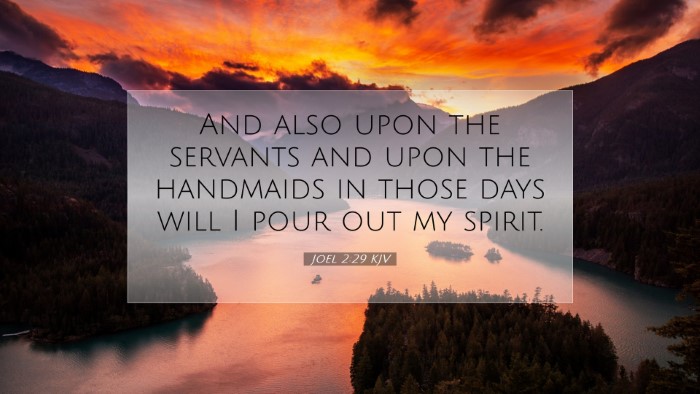Commentary on Joel 2:29
Joel 2:29 states: "And also upon the servants and upon the handmaids in those days will I pour out my spirit." This verse carries profound theological and eschatological significance, reflecting the inclusivity of God’s promise and the transformative power of the Holy Spirit. Below is a detailed commentary, synthesizing insights from public domain sources.
Contextual Background
The Book of Joel is a part of the Minor Prophets in the Old Testament and predominantly addresses issues of judgment, repentance, and restoration following a plague of locusts. Joel draws on these calamities to illuminate God’s call to Israel for repentance, emphasizing that divine deliverance and blessings are contingent upon sincere return to God.
The Theme of Spirit Empowerment
In Joel 2:29, the promise of the Spirit being poured out signifies a pivotal transition in how God's presence is experienced among His people. It reflects the upcoming age of the Messiah, where the accessibility of God's Spirit is no longer reserved for a select few.
Matthew Henry's Insights
Henry notes that this outpouring of the Spirit is to be universal, encompassing all demographics—servants and handmaids, indicating that there are no social or gender barriers in God’s economy. This mirrors the New Testament fulfillment in Acts 2:17, where Peter cites Joel to underscore the expansive nature of the gospel and empowerment in the Church.
Albert Barnes’ Interpretation
Barnes emphasizes the significance of the phrase "servants and handmaids." He highlights that in the eyes of God, all are equal recipients of His Spirit. The outpouring signals a democratization of spiritual gifts. This aligns with the New Covenant, establishing a new relationship where all believers, regardless of status, are imbued with divine empowerment for ministry.
Adam Clarke’s Exegesis
Clarke adds depth by elucidating how the term "pour out" implies an abundant, generous giving of the Spirit. This imagery suggests not a mere sprinkling but a life-giving flow that empowers and enables service. Moreover, Clarke states that the prophets of the Old Testament often predicted the infilling of the Spirit as a precursor to the Messianic age, which reaffirms the anticipation of Christ’s coming.
Theological Implications
The implications of Joel 2:29 are far-reaching and foundational for pastoral theology and ecclesiology. This text encapsulates the notion of the priesthood of all believers, whereby each individual is imbued with the Spirit’s gifts for the edification of the Church.
- Inclusivity of God's Calling: The promise extends beyond traditional religious leaders, suggesting that every believer can engage in prophetic witness and service.
- Empowerment for Ministry: The pouring out of the Spirit equips believers for diverse forms of ministry, highlighting the activist nature of faith.
- Affirmation of Gender Roles: This passage serves as a counterpoint to restrictive interpretations of gender roles, affirming that both men and women are divinely chosen instruments in God's plan.
Impact on Today’s Church
Understanding this verse is vital for contemporary Christian practice. It speaks to the Church’s role in fostering environments where the Holy Spirit can manifest through all believers. The implications are radically transformative for mission and outreach.
Encouragement for Pastors and Leaders
Pastors can draw from this text to cultivate a community where gifts of the Spirit are recognized and empowered across all layers of the congregation. Instructing congregants about their value in God’s plan helps dismantle barriers that often prevent full participation in spiritual gifts.
Application for Theologians and Scholars
Theologians can explore the intertextuality of Joel 2:29 with New Testament texts to frame discussions on pneumatology—the study of the Holy Spirit. The insights derived from Joel can contribute to a broader understanding of the eschatological role of the Spirit in the Church today.
Conclusion
Joel 2:29 ultimately presents a hopeful vision of divine outpouring that transcends earthly limitations. It is a clarion call for believers to engage with the Holy Spirit profoundly, recognizing the incredible gift that empowers them for the work of the Kingdom. This promise extends to all, shaping an inclusive and dynamic expression of faith in the community of believers.


